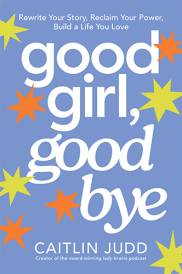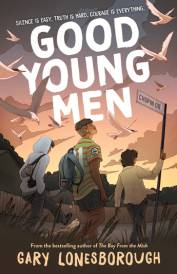Darren Robertson Target 100 Interview
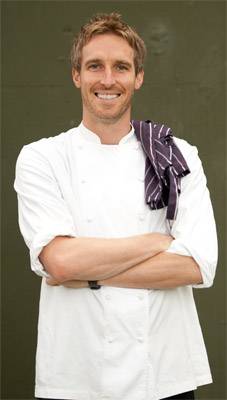
Darren Robertson Target 100 Interview
Target 100 has partnered with Darren Robertson, Chef at Three Blue Ducks in Sydney, to help consumers dish up more sustainable beef and lamb meals at home via a new Facebook app.
The Facebook app has been launched and is available via the Target 100 Facebook page: www.facebook.com/target100AUS. The app invites people to submit their own beef or lamb recipe to be in the running to win an exclusive dining experience hosted by Darren at Three Blue Ducks.
Target 100 is an initiative by Australian cattle and sheep farmers to deliver sustainable farming by 2020 and help Australians understand more about where their food comes from.
Darren, former head chef of Tetsuya, is known for establishing The Table Sessions -guerrilla dining' - pop-up dinners in warehouses, parks, beaches, gardens, rooftops, galleries and theatres. In 2011 Darren opened Sydney restaurant Three Blue Ducks.
Darren is passionate about sustainable practices and will be personally judging the recipe entries. 'At Three Blue Ducks I only use beef that is sustainably farmed and it's important for me know and use local suppliers where possible".
'I'm really looking forward to see what sustainable dishes Aussies are cooking up this summer" Darren said.
The competition will run nationally from Thursday, 15th of November and closes on Friday, 14th of December 2013. Flights and accommodation are included as part of the prize, if required.
Target 100
Target 100 is an initiative by Australian cattle and sheep farmers to deliver sustainable farming by 2020 and help Australians understand more about where their food comes from.
The Target 100 initiatives are 100 research projects funded by the cattle and sheep industry to help continually improve farming practices.
Target 100 aims to communicate with all about how their food is produced. As for many city-folk, farming is not close to home, Target 100 includes an interactive online platform, www.target100.com.au and social media which will enable all Australians to ask questions, receive regular updates, voice their opinions, get simple tips on being more sustainable at home and join online forums.
Who is behind Target 100: Australian cattle and sheep farmers from across Australia are the driving force behind Target 100, through our industry representative bodies, Cattle Council of Australia, Sheepmeat Council of Australia, Australian Meat Industry Council, Australian Lot Feeders Association, Australian Meat Processing Corporation and service provider Meat & Livestock Australia – with a commitment to a more sustainable industry.
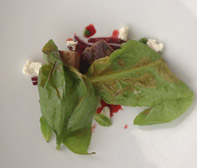 Lamb Shoulder, Beetroot, Mint and Sorrel
Lamb Shoulder, Beetroot, Mint and Sorrel
Serves 6
Ingredients
1 lamb shoulder
6cloves garlic
1 bay leaf 10ml olive oil
1 sprig rosemary
1 sprig of thyme
300ml water
12 sorrel leaves
12 sprigs mint
10g sheep's milk cheese
1 large beetroot (peeled and cut into strips)
10g sugar
10ml water
Salt and pepper
Method
Season the lamb with salt and pepper. Place in a deep baking tray, smash the garlic herbs and oil, rub into the lamb, cover with tin foil and then cook for 4 hours at 170 degrees. The lamb is ready when it pulls away from the bone.
In a frying pan caramelise the sugar, carefully add the beetroot and the water, cook for 1 minute. Serve on a plate with chunks of lamb, torn mint and crumbled sheep's milk cheese.
The Facebook app has been launched and is available via the Target 100 Facebook page: www.facebook.com/target100AUS. The app invites people to submit their own beef or lamb recipe to be in the running to win an exclusive dining experience hosted by Darren at Three Blue Ducks.
Target 100 is an initiative by Australian cattle and sheep farmers to deliver sustainable farming by 2020 and help Australians understand more about where their food comes from.
Darren, former head chef of Tetsuya, is known for establishing The Table Sessions -guerrilla dining' - pop-up dinners in warehouses, parks, beaches, gardens, rooftops, galleries and theatres. In 2011 Darren opened Sydney restaurant Three Blue Ducks.
Darren is passionate about sustainable practices and will be personally judging the recipe entries. 'At Three Blue Ducks I only use beef that is sustainably farmed and it's important for me know and use local suppliers where possible".
'I'm really looking forward to see what sustainable dishes Aussies are cooking up this summer" Darren said.
The competition will run nationally from Thursday, 15th of November and closes on Friday, 14th of December 2013. Flights and accommodation are included as part of the prize, if required.
Target 100
Target 100 is an initiative by Australian cattle and sheep farmers to deliver sustainable farming by 2020 and help Australians understand more about where their food comes from.
The Target 100 initiatives are 100 research projects funded by the cattle and sheep industry to help continually improve farming practices.
Target 100 aims to communicate with all about how their food is produced. As for many city-folk, farming is not close to home, Target 100 includes an interactive online platform, www.target100.com.au and social media which will enable all Australians to ask questions, receive regular updates, voice their opinions, get simple tips on being more sustainable at home and join online forums.
Who is behind Target 100: Australian cattle and sheep farmers from across Australia are the driving force behind Target 100, through our industry representative bodies, Cattle Council of Australia, Sheepmeat Council of Australia, Australian Meat Industry Council, Australian Lot Feeders Association, Australian Meat Processing Corporation and service provider Meat & Livestock Australia – with a commitment to a more sustainable industry.
 Lamb Shoulder, Beetroot, Mint and Sorrel
Lamb Shoulder, Beetroot, Mint and SorrelServes 6
Ingredients
1 lamb shoulder
6cloves garlic
1 bay leaf 10ml olive oil
1 sprig rosemary
1 sprig of thyme
300ml water
12 sorrel leaves
12 sprigs mint
10g sheep's milk cheese
1 large beetroot (peeled and cut into strips)
10g sugar
10ml water
Salt and pepper
Method
Season the lamb with salt and pepper. Place in a deep baking tray, smash the garlic herbs and oil, rub into the lamb, cover with tin foil and then cook for 4 hours at 170 degrees. The lamb is ready when it pulls away from the bone.
In a frying pan caramelise the sugar, carefully add the beetroot and the water, cook for 1 minute. Serve on a plate with chunks of lamb, torn mint and crumbled sheep's milk cheese.
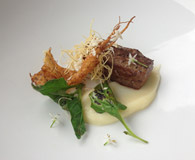 Beef Flatiron, Parsnips, Greens and Horseradish
Beef Flatiron, Parsnips, Greens and Horseradish Serves 6
Ingredients
1kg flatiron steak cut into 6 pieces
1kg parsnips
200ml vegetable oil
100g rock salt
12 sprigs warrigal greens or spinach
100ml milk
10g butter
Half a lemon
3og horseradish
Method
Wash and roast the parsnips whole on the rock salt for 1 hour at 180 degrees. Peel and fry the skins in 180 degree vegetable oil. Liquidise the parsnips with milk and butter, season with salt pepper and lemon juice.
Season the beef with salt and pepper, then char gill on a medium heat for 3 minutes, turning continuously. Leave the beef to rest for a couple of minutes, then serve with the parsnip, charred greens and freshly grated horse radish.
Interview with Darren Robertson
Question: Why did you decide to partner with Target 100?
Darren Robertson: I've been involved with MLA (Meat & Livestock Australia) for many years and I phone them if I have a query about meat or suppliers; they approached me to be the face of this competition.
Question: What is the goal of Target 100?
Darren Robertson: Target 100 is a part of what MLA (Meat & Livestock Australia) do and their ultimate goal is to make beef and lamb absolutely sustainable by 2020. To achieve this goal they have created 100 initiatives, viewable on the website target100.com.au, such as research to develop recycling water, easing gas emissions, measuring mass and how we can develop to minimise our footprint on the land and the effect that we have on the environment. They have opened the dialogue between farmers, producers, chefs and customers similar to a forum for information sharing.
Question: What do you hope the Target 100 competition achieves?
Darren Robertson: I hope the Target 100 competition brings awareness to the Target 100 project and encourages people to cook and in doing so find out about produce such as where it came from and how it's been treated.
Question: As the judge, what are you looking for from the recipes submitted?
Darren Robertson: The recipe has to sound tasty but what really interests me is innovative ways of using interesting and under-utilised cuts of meat and using the whole vegetable. An example is using a baby carrot and then using the carrot tops to make a pesto or other clever ideas that entrants use and have thought through.
Question: What makes a dish sustainable?
Darren Robertson: A number of things make a dish sustainable but mainly sourcing the produce and ensuring it is sustainable, for this competition it needs to be sustainable lamb or beef. It's important to utilise some of the other cuts not just lamb chops but trying lamb belly ect.
Question: Can you talk about the sustainable practices menu at Three Blue Ducks?
Darren Robertson: We try and develop the business sustainably however we are not perfect by any stretch of the imagination but we have a new system that eradicates one bin load of plastic bottles, a week. We have just gone full solar power on both sides and we try and use as much locally sourced produce, as we can.
We talk to our producers whether that is in regards to meat, seafood or vegetables and find out where things are coming from, what they have been fed and how it's been treated. We're quite a young team so sustainably is a subject matter that is always on the forefront of what we do and we question, each other.
It's important to work smarter with waste which is important for households and commercial; we need to be aware what we're doing with produce and make sure we're using the whole thing, when using a fennel we use the fennel stalk and fronds not just the bulb; this goes with everything, we buy a whole chicken and use the whole thing including the breast, braise the legs and use the skin, then we will make a stock and try and use the whole chicken so a little bit of food goes a lot further and there is less waste. We have a little garden so we grow bits and pieces that we use too.
Question: How important is where you buy your meat for Three Blue Ducks?
Darren Robertson: Absolutely and I think it should be important for everyone to know where their meat is coming from. I have built relationships with my supplies and I suggest you find out about the produce you buy.
Darren Robertson: I've been involved with MLA (Meat & Livestock Australia) for many years and I phone them if I have a query about meat or suppliers; they approached me to be the face of this competition.
Question: What is the goal of Target 100?
Darren Robertson: Target 100 is a part of what MLA (Meat & Livestock Australia) do and their ultimate goal is to make beef and lamb absolutely sustainable by 2020. To achieve this goal they have created 100 initiatives, viewable on the website target100.com.au, such as research to develop recycling water, easing gas emissions, measuring mass and how we can develop to minimise our footprint on the land and the effect that we have on the environment. They have opened the dialogue between farmers, producers, chefs and customers similar to a forum for information sharing.
Question: What do you hope the Target 100 competition achieves?
Darren Robertson: I hope the Target 100 competition brings awareness to the Target 100 project and encourages people to cook and in doing so find out about produce such as where it came from and how it's been treated.
Question: As the judge, what are you looking for from the recipes submitted?
Darren Robertson: The recipe has to sound tasty but what really interests me is innovative ways of using interesting and under-utilised cuts of meat and using the whole vegetable. An example is using a baby carrot and then using the carrot tops to make a pesto or other clever ideas that entrants use and have thought through.
Question: What makes a dish sustainable?
Darren Robertson: A number of things make a dish sustainable but mainly sourcing the produce and ensuring it is sustainable, for this competition it needs to be sustainable lamb or beef. It's important to utilise some of the other cuts not just lamb chops but trying lamb belly ect.
Question: Can you talk about the sustainable practices menu at Three Blue Ducks?
Darren Robertson: We try and develop the business sustainably however we are not perfect by any stretch of the imagination but we have a new system that eradicates one bin load of plastic bottles, a week. We have just gone full solar power on both sides and we try and use as much locally sourced produce, as we can.
We talk to our producers whether that is in regards to meat, seafood or vegetables and find out where things are coming from, what they have been fed and how it's been treated. We're quite a young team so sustainably is a subject matter that is always on the forefront of what we do and we question, each other.
It's important to work smarter with waste which is important for households and commercial; we need to be aware what we're doing with produce and make sure we're using the whole thing, when using a fennel we use the fennel stalk and fronds not just the bulb; this goes with everything, we buy a whole chicken and use the whole thing including the breast, braise the legs and use the skin, then we will make a stock and try and use the whole chicken so a little bit of food goes a lot further and there is less waste. We have a little garden so we grow bits and pieces that we use too.
Question: How important is where you buy your meat for Three Blue Ducks?
Darren Robertson: Absolutely and I think it should be important for everyone to know where their meat is coming from. I have built relationships with my supplies and I suggest you find out about the produce you buy.
MORE



